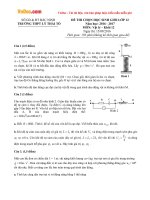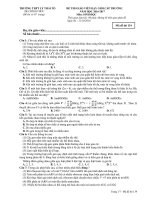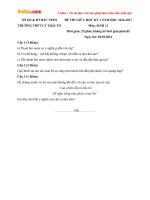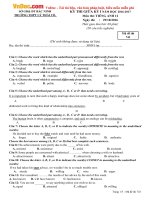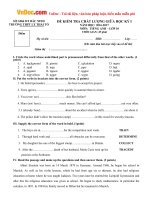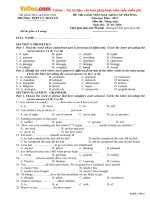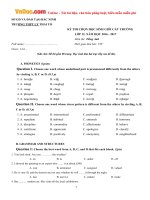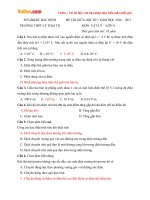Đề thi giáo viên giỏi môn Tiếng Anh trường THPT Lý Thái Tổ, Bắc Ninh năm học 2016 - 2017 có đáp án
Bạn đang xem bản rút gọn của tài liệu. Xem và tải ngay bản đầy đủ của tài liệu tại đây (404.78 KB, 14 trang )
VnDoc - Tải tài liệu, văn bản pháp luật, biểu mẫu miễn phí
SỞ GIÁO DỤC & ĐÀO TẠO
TRƯỜNG THPT LÝ THÁI TỔ
(Đề thi gồm có 6 trang)
ĐỀ THI GIÁO VIÊN DẠY GIỎI CẤP TRƯỜNG
Năm học 2016 - 2017
Môn thi: Tiếng Anh
Ngày thi: 21 /10 /2016
Thời gian làm bài: 90 phút (không kể thời gian giao đề)
-------------------------
FULL NAME : ........................................................................
SECTION I. PHONETICS
Part 1. Find the word whose underlined part is pronounced differently. Circle the letter preceding the
correct answer (A, B, C or D).
1. A. solar
B. polar
C. scholar
D. molar
2. A. tsunami
B. listen
C. wrestling
D. Christmas
3. A. champage
B. chamber
C. champers
D. chanteuse
5. A. passage
B. massage
C. damage
D. hostage
5. A. naked
B. coughed
C. hatred
D. sacred
Part 2. Identify the word whose stress pattern is different from that of the other words in the same group.
Circle the letter preceding the correct answer (A, B, C or D).
6. A. compensate
B. contribute
C. gratitude
D. memorize
7. A. repudiate
B. habitual
C. entrench
D. hormone
8. A. discipline
B. commodity
C. affectionate
D. behave
9. A. Bulgaria
B. Brazil
C. Japan
D. Canada
10. A. strategies
B. positively
C. anonymity
D. neighborhood
SECTION II: LEXICO – GRAMMAR.
Part 1. Choose the word or phrase that best completes each sentence. Circle the letter preceding the
correct answer (A, B, C or D).
11. You will have to comply ………….these rules or you’ll lose your job.
A. to
B. about
C. for
D. with
12. I am afraid a rise in salary is …………….just now.
A. out of sight
B. out of control
C. out of date
D. out of question
13. Nothing can grow in this poor …………………..
A. surface
B. grass
C. ground
D. soil
14. “How was your teaching job last winter?” “I regret ……………. harder to help my students.”
A. not tried
B. not having tried
C. not to try
D. not have tried
15. Not until ………………himself seriously ill
A. he had completed the task did he find
B. had he completed the task did he find
C. he completed the task did he find
D. did he completed the task he had found
16. I was just …………………to go out when you telephoned.
A. around
B. about
C. thinking
D. planned
17. It is difficult to pay one’s bill when prices keep ………………….
A. rising
B. growing
C. gaining
D. raising
18. …………….drivers usually drive very slowly.
A. Practice
B. Student
C. Learning
D. Learner
19. You ……………….all those provisions. We’re going for a weekend, not a month!
A. mustn’t buy
B. needn’t buy
C. needn’t have bought
D. mustn’t have bought
20. All things…………….., he is the best president we are likely to get.
A. thought
B. taken
C. added
D. considered
21. Linda is married ……………..three children.
A. to
B. at
C. with
D. of
22. Wasn’t it you …………….the door open?
PAGE 1 OF 6
VnDoc - Tải tài liệu, văn bản pháp luật, biểu mẫu miễn phí
A. to leave
B. to have left
C. who left
D. that should leave
23. ………………..with the size of the whole earth, the highest mountain do not seem high at all.
A. When compared
B. Compare them
C. If you compare
D.A comparison
24. On the table…………………..
A. the disks lay
B. lay the disks
C. did the disks lie
D. lied the disks
25. As it was raining, Paul didn’t………………..like walking home.
A. fancy
B. wish
C. want
D. feel
26. It’s only a small lamp, so it doesn’t ……………….off much light.
A. cast
B. spend
C. give
D. shed
27. The letter _________ me of the theft hadn’t been signed.
A. to accuse
B. accusing
C. accused
D. that accuse
28. I am not able to go anywhere this weekend because I am up to my __________ in work.
A. neck
B. nose
C. head
D. eyes
29. Many lists of “Wonders of the World” ___________ during the Middle Ages.
A. said to be existed
B. are said to exist
C. said to exist
D. are said to have existed
30. “I feel really thirsty. Have you got anything to drink?”
“ …………….”
A. Do you prefer some lemonade?
B. Do you take some lemonade?
C. Would you like some lemonade?
D. Could you have some lemonade?
31. “Who do you play tennis with?” “……………………..”
A. My sister does
B. My sister
C. I do
D. Every weekend
32. The police ……………..a good deal of criticism over their handling of the demonstration.
A. came in for
B. brought about
C. opened up
D. went down with
33. Workers who do not obey the safety regulations will be _______ immediately.
A. refused
B. rejected
C. disapproved
D. dismissed
34. Stars shine because of _______ produced by the nuclear reactions taking place within them.
A. the amount of light and heat is
B. which the amount of light and heat
C. the amount of light and heat that it is
D. the amount of light and heat
35. It is necessary that one ________ a lawyer before signing an important contract.
A. consulted
B. consult
C. consults
D. has consulted
36. Can you see to these letters first, please? The others ________ answered immediately.
A. must be
B. don’t have to be
C. mustn’t be
D. have to be
37. The train was ________ by a heavy snowfall.
A. held off
B. held out
C. held back
D. held up
Part 2. Mark the letter A,B,C or D on your answer sheet to show the underlined part that needs
correction.
38. Hard and resistant to corrosion, bronze is traditionally used in bell casting and is the material
A
B
C
used widely most for metal sculpture.
D
39. By identifying similar words or structures in different languages, we find evidence that those
A
languages are related and may be derived from same ancestor .
B
C
D
40. A number of large insurance companies has their headquarters in the capital city.
PAGE 2 OF 6
VnDoc - Tải tài liệu, văn bản pháp luật, biểu mẫu miễn phí
A
B
C
D
41. New laws should be introduced to reduce the number of traffic in the city center.
A
B
C
D
42. When readers contribute funds to private libraries, these readers are used the library without charge.
A
B
C
D
Part 3. Mark the letter A,B,C or D on your answer sheet to indicate the word or phrase that is
OPPOSITE in meaning to the underlined part in each of the following sentences.
43. Oil exports account for nearly 80% of the country’s foreign earnings.
A. money
B. expenditure
C. savings
D. income
44. In the first two decades of its existence, the cinema developed rapidly.
A. shortly
B. sluggishly
C. leisurely
D. weakly
Part 4. Mark the letter A,B,C or D on your answer sheet to indicate the word or phrase that is CLOSEST in
meaning to the underlined part in each of the following sentences.
45. Since 1886, the Statue of Liberty has been one off the most famous monuments in America.
A. memorials
B. places
C. houses
D. destinations
46. Without realizing it, John drove backwards into a lamp post.
A. reversed
B. went ahead
C. proceeded
D. looked forward
SECTION III. READING.
Part 1. Read the following passage and circle the letter preceding the correct answer (A, B, C, or D)
which best fits each gap.
Voluntary work is work that you do not get paid for and usually involves in doing things to help other
people, especially the elderly or the sick. or working on (47)__________of a charity or similar
organization. Most charitable organizations rely on unpaid volunteers, and thousands of Americans and
British people give many hours of their time to doing some form of social work or organizing - fund
raising events to support the work. Volunteering is especially popular in the US and the reasons this may
be found in (48)__________American values such as the Protestant work ethic, the idea that work
improves the person who does it, and the belief that people can change their (49)__________if they try
hard enough.
In the US young people over 18 can take part in AmeriCorps, a government programme that
(50)__________them to work as volunteers for a period of time, with the (51)__________of help in
paying for their education later. Older Americans who do not work may spend much of their free time
volunteering.
In Britain a lot of voluntary work is directed towards supporting the country’s social services. The
WRVS and other organizations run a meals- on- wheels service in many parts of Britain,
(52)__________hot food for old people who are (53)__________to cook for themselves. The nationwide
Citizens Advice Bureau, which offers free advice to the public (54)__________a wide range of issues, is
run (55)__________by volunteers, and the Blood Transfusion Service relies on voluntary blood donors to
give blood for use in hospitals. Political parties use volunteers at election time, and Churches depend on
volunteers to (56) ___________ buildings clean.
47. A. behalf
B. basic
C. account
D. ground
48. A. basic
B. primary
C. top
D. essential
49. A. standard
B. nature
C. condition
D. appearance
50. A. commissions
B. guides
C. encourages
D. engages
51. A. function
B. reply
C. favour
D. promise
52. A. serving
B. providing
C. selling
D. offering
53. A. incapable
B. unable
C. enabled
D. offering
54. A. on
B. with
C. for
D. through
PAGE 3 OF 6
VnDoc - Tải tài liệu, văn bản pháp luật, biểu mẫu miễn phí
55. A. equally
B. mainly
C. substantially
D. frequently
56. A. stay
B. get
C. help
D. keep
Read the following passage and answer the questions that follow.
My lawyer, Mr. Turner, is the only man I know who has seen a ghost. He is a quiet eventempered man whose life is spent in dealing with facts. He is the last person in the world to give way
to fantasy. He has a wife and two children of whom he is proud, takes a modest holiday abroad every
year and spends his Sundays gardening. He is knowledgeable about art and architecture, though he
doesn’t pretend to be an expert by any means. It is, therefore, all the more surprising that he should be
so insistent about the ghost. It happened, so he says, like this:
He was travelling from London to the north of England by train. It was a misty November
evening and the train was half empty. In fact, for the first part of the journey Mr. Turner had the
carriage to himself and sat dozing over a newspaper. However, at the first stop a passenger jumped in,
slamming the door behind him. He seemed out of his breath as if he had been running. He was a
striking looking young man with dark, bushy hair and bright intelligent eyes. He was dressed rather
oddly in a long waistcoat with silver buttons, tight trousers and embroidered waistcoat. Mr. Turner
didn’t pay much attention to this because people wear all sorts of extravagant clothes these days and
he had long grown accustomed to them.
Presently, the two men got into conversation, as people do on long journeys. Mr. Turner was
interested to discover that the young man was very knowledgeable about art – in particular portraits.
His name, he said, was Joseph Hart, and he was on his way to visit an exhibition. It seemed that he
worked in a famous London Art Gallery – a picture restorer, perhaps, thought Mr. Turner, he seemed
to know a great deal about varnishes and paints, and even more about the subjects of certain portraits.
When Mr. Turner asked his opinion of the portrait of a famous judge by an artist he admired, his
companion laughed and said: “He’s only a reproduction – a good one I agree but you can’t talk to a
reproduction”. He spoke as though the person in the portrait were still living.
After a while the carriage got hot and steamy and Mr. Turner dropped off. He woke up just as
the train was drawing up at a junction with a grinding of brakes. His companion had disappeared.
A few days later, having returned to London, Mr. Turner found himself near the Art Gallery.
Moved by some impulse, he went in and inquired for Joseph Hart. The attendant directed him to a
room devoted to early nineteenth century portraits of well-known men. There was no one in the room
and Mr. Turner looked around him. Without knowing quite how he had got there, he found himself
standing in front of a full-length portrait of a young dark man in tight trousers and an embroidered
waistcoat. The eyes smiled at him with a hint of amusement. The name-plate at the foot of the picture
read: Joseph Hart, Gentleman, 1800-1835.
57. What kind of person was Mr. Turner?
A. Imaginative
B. Fantastic
C. Sensible
D. Insensitive
58. Although he was a lawyer, Mr. Turner_________.
A. pretended to know a lot about art.
B. knew something about art
C. pretended to take interest in art.
D. intended to learn more about art.
59. When the passenger entered Mr. Turner’s department, ________.
A. he was panting
B. he was running
C. the train was just training
D. the carriage was half-empty.
60. The passenger’s clothes didn’t seem strange to Mr. Turner because ________.
A. he was used to wearing strange clothes. B. he liked people who wore strange clothes
C. everyone he knew wore strange clothes. D. he had seen a lot of people in strange clothes
61. Mr. Turner thought the young man might _______.
A. be an Art Dealer
B. be an Art Expert
C. renew old pictures
D. paint reproductions of old pictures
62. Why wouldn’t the young man give an opinion on the portrait of the judge?
PAGE 4 OF 6
VnDoc - Tải tài liệu, văn bản pháp luật, biểu mẫu miễn phí
A. The judge wasn’t alive.
B. The judge was still alive.
C. The picture was a copy.
D. He hadn’t seen it.
63. When did Mr. Turner first realize that the passenger had gone?
A. When the train started.
B. After the train had stopped.
C. Just before the train stopped.
D. When the train was leaving the station.
64. Why did Mr. Turner go into the Art Gallery?
A. He was walking past there.
B. He had never been there before.
C. He has planned to do so
D. He suddenly decided to.
65. In the part of the Gallery that Mr. Turner was directed to, ________.
A. there were a lot of pictures of unknown people
B. there were a lot of nineteenth century people
C. no one else was looking at the pictures
D. he only saw one portrait.
66. When Mr. Turner looked the portrait of Joseph Hart, _______.
A. he smiled at it
B. he thought it smiled at him
C. he didn’t recognize it
D. he was amused
Read the following passage and choose the best answer to each of the questions.
There is a common expression in the English language referring to the blue moon. When people say
something that happens “only once in a blue moon,” they mean that it happens only very rarely, once in a great
while. This expression has been around for at least a century and a half; There are references to this expression
that date from the second half of the nineteenth century.
The expression “a blue moon” has come to refer to the second full moon occurring in any given
calendar month. A second full moon is called a blue moon not because it is particularly blue or is any different
in hue from the first full moon of the month. Instead, it is called a blue moon because it is so rare. The moon
needs a little more than 29 days to complete its cycle from full moon to full moon. Because every month except
February has more than 29 days, every month will have at least one full moon (except the 28-day February,
which will have a full moon unless there is a full moon at the very end of January and another full moon at the
very beginning of March). It is on the occasion when a given calendar month has a second full moon that a blue
moon occurs. This does not happen very often, only three or four times in a decade.
The blue moons of today are called blue moons because of their rarity and not because of their color;
however, the expression “blue moon” may have come into existence in reference to unusual circumstances in
which the moon actually appeared blue. Certain natural phenomena of gigantic proportions can actually change
the appearance of the moon from Earth. The eruption of Krakatao volcano in 1883 left dust particles in the
atmosphere, which clouded the sun and gave the moon a bluish tint. This particular occurrence of the blue
moon may have given rise to the expression that we use today. Another example occurred more than century
later. When Mount Pinatubo erupted in the Philippines in 1991, the moon again took on a blue tint.
67. According to paragraph 2, the second full moon is called “the blue moon” because
.
A. it is infrequent
B. it has a bluish hue
C. it appears on unhappy days
D. it is bluer than the first full moon
68. If one full moon is on the second of May, another one will probably be on
.
th
st
st
A. May 30
B. May 31
C. June 1
D. June 2nd
69. The word “its” in paragraph 2 refers to “
”.
A. the moon’s
B. the day’s
C. the month’s
D. February’s
70. Which of the following dates can be a blue moon day?
PAGE 5 OF 6
VnDoc - Tải tài liệu, văn bản pháp luật, biểu mẫu miễn phí
A. February 28th
B. March 4th
C. August 22nd
D. November 30th
71. It can be inferred from the passage that
.
A. the expression “once in a blue moon” is used only when blue moon appears.
B. the blue moon is bigger but darker than the first full moon.
C. the occasion of the blue moon happens every four years.
D. natural activities on Earth can alter the look of the moon.
72. The phrase “come into existence” in paragraph 3 can be best replaced by “
”.
A. comprised
B. been created
C. associated
D. been overlooked
73. It can be inferred from the passage that
.
A. polluted air can put a blue coat on the moon
B. full moon never occurs in February
C. no one can see full moon twice in their life
D. full moon happens after a volcanic eruption
74. The word “which” in paragraph 3 refers to “
”.
A. the eruption
B. the Krakatao volcano
C. the dust particles D. the cloud
75. The word “tint” in paragraph 3 mostly means “
”.
A. surface
B. light
C. blur
D. shade
76. The author is trying to
.
A. explain what the expression “once in a blue moon” means
B. define what a blue moon is
C. correct people’s false assumption about a blue moon
D. predict when a blue moon will happen
SECTION IV. WRITING.
Circle the letter A, B, C, or D on your answer sheet to indicate the sentence that is closest in meaning
to each of the following questions.
77. It is possible that we won't have to take an entrance exam this year.
A. Perhaps we don't have to take an entrance exam this year.
B. We must take an entrance exam this year.
C. We mightn't take an entrance exam this year.
D. It is very likely that we will take an entrance exam this year.
78. It's ages since I last saw a Hollywood film.
A. I saw a last Hollywood film since ages ago.
B. I haven't seen a Hollywool film for a long time.
C. I haven't seen any Hollywood films before.
D. It's ages because I last saw a Hollywood film.
79. He offered to help her with the heavy suitcase, which was kind.
A. The suitcase which he offered to help her with was kind.
B. It was kind of him to offer to help her with the suitcase
C. He offered to help her but the suitcase was too heavy.
D. It was kind of her to have him help with the suitcase
80. Mary apologises for having kept them waiting.
A. Mary has been waiting for them for a long time.
B. Mary is sorry they were very late.
C. Mary says they called to say they will be late.
D. Mary is sorry that she made them wait for her.
------------ THE END -----------PAGE 6 OF 6
VnDoc - Tải tài liệu, văn bản pháp luật, biểu mẫu miễn phí
PAGE 7 OF 6
VnDoc - Tải tài liệu, văn bản pháp luật, biểu mẫu miễn phí
KEYS:
SỞ GIÁO DỤC & ĐÀO TẠO
TRƯỜNG THPT LÝ THÁI TỔ
(Đề thi gồm có 7 trang)
ĐÁP ÁN
ĐỀ THI GIÁO VIÊN DẠY GIỎI CẤP TRƯỜNG
Năm học 2016 - 2017
Môn thi: Tiếng Anh
Ngày thi: 21/11/ 2016
Thời gian làm bài: 90 phút (không kể thời gian giao đề)
-------------------------
FULL NAME : ........................................................................
SECTION I. PHONETICS
Part 1. Find the word whose underlined part is pronounced differently. Circle the letter preceding the
correct answer (A, B, C or D).
1. A. solar
B. polar
C. scholar
D. molar
2. A. tsunami
B. listen
C. wrestling
D. Christmas
3. A. champage
B. chamber
C. champers
D. chanteuse
5. A. passage
B. massage
C. damage
D. hostage
5. A. naked
B. coughed
C. hatred
D. sacred
Part 2. Identify the word whose stress pattern is different from that of the other words in the same group.
Circle the letter preceding the correct answer (A, B, C or D).
6. A. compensate
B. contribute
C. gratitude
D. memorize
7. A. repudiate
B. habitual
C. entrench
D. hormone
8. A. discipline
B. commodity
C. affectionate
D. behave
9. A. Bulgaria
B. Brazil
C. Japan
D. Canada
10. A. strategies
B. positively
C. anonymity
D. neighborhood
SECTION II: LEXICO – GRAMMAR.
Part 1. Choose the word or phrase that best completes each sentence. Circle the letter preceding the
correct answer (A, B, C or D).
11. You will have to comply ………….these rules or you’ll lose your job.
A. to
B. about
C. for
D. with
12. I am afraid a rise in salary is …………….just now.
A. out of sight
B. out of control
C. out of date
D. out of question
13. Nothing can grow in this poor …………………..
A. surface
B. grass
C. ground
D. soil
14. “How was your teaching job last winter?” “I regret ……………. harder to help my students.”
B. not tried
B. not having tried
C. not to try
D. not have tried
15. Not until ………………himself seriously ill
A. he had completed the task did he find
B. had he completed the task did he find
C. he completed the task did he find
D. did he completed the task he had found
16. I was just …………………to go out when you telephoned.
A. around
B. about
C. thinking
D. planned
17. It is difficult to pay one’s bill when prices keep ………………….
A. rising
B. growing
C. gaining
D. raising
18. …………….drivers usually drive very slowly.
A. Practice
B. Student
C. Learning
D. Learner
19. You ……………….all those provisions. We’re going for a weekend, not a month!
A. mustn’t buy
B. needn’t buy
C. needn’t have bought
D. mustn’t have bought
20. All things…………….., he is the best president we are likely to get.
A. thought
B. taken
C. added
D. considered
21. Linda is married ……………..three children.
PAGE 8 OF 6
VnDoc - Tải tài liệu, văn bản pháp luật, biểu mẫu miễn phí
A. to
B. at
C. with
D. of
22. Wasn’t it you …………….the door open?
A. to leave
B. to have left
C. who left
D. that should leave
23. ………………..with the size of the whole earth, the highest mountain do not seem high at all.
A. When compared
B. Compare them
C. If you compare
D.A comparison
24. On the table…………………..
A. the disks lay
B. lay the disks
C. did the disks lie
D. lied the disks
25. As it was raining, Paul didn’t………………..like walking home.
A. fancy
B. wish
C. want
D. feel
26. It’s only a small lamp, so it doesn’t ……………….off much light.
A. cast
B. spend
C. give
D. shed
27. The letter _________ me of the theft hadn’t been signed.
A. to accuse
B. accusing
C. accused
D. that accuse
28. I am not able to go anywhere this weekend because I am up to my __________ in work.
A. neck
B. nose
C. head
D. eyes
29. Many lists of “Wonders of the World” ___________ during the Middle Ages.
A. said to be existed
B. are said to exist
C. said to exist
D. are said to have existed
30. “I feel really thirsty. Have you got anything to drink?”
“ …………….”
A. Do you prefer some lemonade?
B. Do you take some lemonade?
C. Would you like some lemonade?
D. Could you have some lemonade?
31. “Who do you play tennis with?” “……………………..”
A. My sister does
B. My sister
C. I do
D. Every weekend
32. The police ……………..a good deal of criticism over their handling of the demonstration.
A. came in for
B. brought about
C. opened up
D. went down with
33. Workers who do not obey the safety regulations will be _______ immediately.
A. refused
B. rejected
C. disapproved
D. dismissed
34. Stars shine because of _______ produced by the nuclear reactions taking place within them.
A. the amount of light and heat is
B. which the amount of light and heat
C. the amount of light and heat that it is
D. the amount of light and heat
35. It is necessary that one ________ a lawyer before signing an important contract.
A. consulted
B. consult
C. consults
D. has consulted
36. Can you see to these letters first, please? The others ________ answered immediately.
A. must be
B. don’t have to be
C. mustn’t be
D. have to be
37. The train was ________ by a heavy snowfall.
A. held off
B. held out
C. held back
D. held up
Part 2. Mark the letter A,B,C or D on your answer sheet to show the underlined part that needs
correction.
38. Hard and resistant to corrosion, bronze is traditionally used in bell casting and is the material
A
B
C
used widely most for metal sculpture.
D
39. By identifying similar words or structures in different languages, we find evidence that those
A
languages are related and may be derived from same ancestor .
B
C
D
40. A number of large insurance companies has their headquarters in the capital city.
PAGE 9 OF 6
VnDoc - Tải tài liệu, văn bản pháp luật, biểu mẫu miễn phí
A
B
C
D
41. New laws should be introduced to reduce the number of traffic in the city center.
A
B
C
D
42. When readers contribute funds to private libraries, these readers are used the library without charge.
A
B
C
D
Part 3. Mark the letter A,B,C or D on your answer sheet to indicate the word or phrase that is
OPPOSITE in meaning to the underlined part in each of the following sentences.
43. Oil exports account for nearly 80% of the country’s foreign earnings.
A. money
B. expenditure
C. savings
D. income
44. In the first two decades of its existence, the cinema developed rapidly.
A. shortly
B. sluggishly
C. leisurely
D. weakly
Part 4. Mark the letter A,B,C or D on your answer sheet to indicate the word or phrase that is CLOSEST in
meaning to the underlined part in each of the following sentences.
45. Since 1886, the Statue of Liberty has been one off the most famous monuments in America.
A. memorials
B. places
C. houses
D. destinations
46. Without realizing it, John drove backwards into a lamp post.
A. reversed
B. went ahead
C. proceeded
D. looked forward
SECTION III. READING.
Part 1. Read the following passage and circle the letter preceding the correct answer (A, B, C, or D)
which best fits each gap.
Voluntary work is work that you do not get paid for and usually involves in doing things to help other
people, especially the elderly or the sick. or working on (47)__________of a charity or similar
organization. Most charitable organizations rely on unpaid volunteers, and thousands of Americans and
British people give many hours of their time to doing some form of social work or organizing - fund
raising events to support the work. Volunteering is especially popular in the US and the reasons this may
be found in (48)__________American values such as the Protestant work ethic, the idea that work
improves the person who does it, and the belief that people can change their (49)__________if they try
hard enough.
In the US young people over 18 can take part in AmeriCorps, a government programme that
(50)__________them to work as volunteers for a period of time, with the (51)__________of help in
paying for their education later. Older Americans who do not work may spend much of their free time
volunteering.
In Britain a lot of voluntary work is directed towards supporting the country’s social services. The
WRVS and other organizations run a meals- on- wheels service in many parts of Britain,
(52)__________hot food for old people who are (53)__________to cook for themselves. The nationwide
Citizens Advice Bureau, which offers free advice to the public (54)__________a wide range of issues, is
run (55)__________by volunteers, and the Blood Transfusion Service relies on voluntary blood donors to
give blood for use in hospitals. Political parties use volunteers at election time, and Churches depend on
volunteers to (56) ___________ buildings clean.
47. A. behalf
B. basic
C. account
D. ground
48. A. basic
B. primary
C. top
D. essential
49. A. standard
B. nature
C. condition
D. appearance
50. A. commissions
B. guides
C. encourages
D. engages
51. A. function
B. reply
C. favour
D. promise
52. A. serving
B. providing
C. selling
D. offering
53. A. incapable
B. unable
C. enabled
D. offering
54. A. on
B. with
C. for
D. through
55. A. equally
B. mainly
C. substantially
D. frequently
PAGE 10 OF 6
VnDoc - Tải tài liệu, văn bản pháp luật, biểu mẫu miễn phí
56. A. stay
B. get
C. help
D. keep
Read the following passage and answer the questions that follow.
My lawyer, Mr. Turner, is the only man I know who has seen a ghost. He is a quiet eventempered man whose life is spent in dealing with facts. He is the last person in the world to give way
to fantasy. He has a wife and two children of whom he is proud, takes a modest holiday abroad every
year and spends his Sundays gardening. He is knowledgeable about art and architecture, though he
doesn’t pretend to be an expert by any means. It is, therefore, all the more surprising that he should be
so insistent about the ghost. It happened, so he says, like this:
He was travelling from London to the north of England by train. It was a misty November
evening and the train was half empty. In fact, for the first part of the journey Mr. Turner had the
carriage to himself and sat dozing over a newspaper. However, at the first stop a passenger jumped in,
slamming the door behind him. He seemed out of his breath as if he had been running. He was a
striking looking young man with dark, bushy hair and bright intelligent eyes. He was dressed rather
oddly in a long waistcoat with silver buttons, tight trousers and embroidered waistcoat. Mr. Turner
didn’t pay much attention to this because people wear all sorts of extravagant clothes these days and
he had long grown accustomed to them.
Presently, the two men got into conversation, as people do on long journeys. Mr. Turner was
interested to discover that the young man was very knowledgeable about art – in particular portraits.
His name, he said, was Joseph Hart, and he was on his way to visit an exhibition. It seemed that he
worked in a famous London Art Gallery – a picture restorer, perhaps, thought Mr. Turner, he seemed
to know a great deal about varnishes and paints, and even more about the subjects of certain portraits.
When Mr. Turner asked his opinion of the portrait of a famous judge by an artist he admired, his
companion laughed and said: “He’s only a reproduction – a good one I agree but you can’t talk to a
reproduction”. He spoke as though the person in the portrait were still living.
After a while the carriage got hot and steamy and Mr. Turner dropped off. He woke up just as
the train was drawing up at a junction with a grinding of brakes. His companion had disappeared.
A few days later, having returned to London, Mr. Turner found himself near the Art Gallery.
Moved by some impulse, he went in and inquired for Joseph Hart. The attendant directed him to a
room devoted to early nineteenth century portraits of well-known men. There was no one in the room
and Mr. Turner looked around him. Without knowing quite how he had got there, he found himself
standing in front of a full-length portrait of a young dark man in tight trousers and an embroidered
waistcoat. The eyes smiled at him with a hint of amusement. The name-plate at the foot of the picture
read: Joseph Hart, Gentleman, 1800-1835.
57. What kind of person was Mr. Turner?
A. Imaginative
B. Fantastic
C. Sensible
D. Insensitive
58. Although he was a lawyer, Mr. Turner_________.
A. pretended to know a lot about art.
B. knew something about art
C. pretended to take interest in art.
D. intended to learn more about art.
59. When the passenger entered Mr. Turner’s department, ________.
A. he was panting
B. he was running
C. the train was just training
D. the carriage was half-empty.
60. The passenger’s clothes didn’t seem strange to Mr. Turner because ________.
A. he was used to wearing strange clothes. B. he liked people who wore strange clothes
C. everyone he knew wore strange clothes. D. he had seen a lot of people in strange clothes
61. Mr. Turner thought the young man might _______.
A. be an Art Dealer
B. be an Art Expert
C. renew old pictures
D. paint reproductions of old pictures
PAGE 11 OF 6
VnDoc - Tải tài liệu, văn bản pháp luật, biểu mẫu miễn phí
62. Why wouldn’t the young man give an opinion on the portrait of the judge?
A. The judge wasn’t alive.
B. The judge was still alive.
C. The picture was a copy.
D. He hadn’t seen it.
63. When did Mr. Turner first realize that the passenger had gone?
A. When the train started.
B. After the train had stopped.
C. Just before the train stopped.
D. When the train was leaving the station.
64. Why did Mr. Turner go into the Art Gallery?
A. He was walking past there.
B. He had never been there before.
C. He has planned to do so
D. He suddenly decided to.
65. In the part of the Gallery that Mr. Turner was directed to, ________.
A. there were a lot of pictures of unknown people
B. there were a lot of nineteenth century
people
C. no one else was looking at the pictures
D. he only saw one portrait.
66. When Mr. Turner looked the portrait of Joseph Hart, _______.
A. he smiled at it
B. he thought it smiled at him
C. he didn’t recognize it
D. he was amused
Read the following passage and choose the best answer to each of the questions.
There is a common expression in the English language referring to the blue moon. When people say
something that happens “only once in a blue moon,” they mean that it happens only very rarely, once in a great
while. This expression has been around for at least a century and a half; There are references to this expression
that date from the second half of the nineteenth century.
The expression “a blue moon” has come to refer to the second full moon occurring in any given
calendar month. A second full moon is called a blue moon not because it is particularly blue or is any different
in hue from the first full moon of the month. Instead, it is called a blue moon because it is so rare. The moon
needs a little more than 29 days to complete its cycle from full moon to full moon. Because every month except
February has more than 29 days, every month will have at least one full moon (except the 28-day February,
which will have a full moon unless there is a full moon at the very end of January and another full moon at the
very beginning of March). It is on the occasion when a given calendar month has a second full moon that a blue
moon occurs. This does not happen very often, only three or four times in a decade.
The blue moons of today are called blue moons because of their rarity and not because of their color;
however, the expression “blue moon” may have come into existence in reference to unusual circumstances in
which the moon actually appeared blue. Certain natural phenomena of gigantic proportions can actually change
the appearance of the moon from Earth. The eruption of Krakatao volcano in 1883 left dust particles in the
atmosphere, which clouded the sun and gave the moon a bluish tint. This particular occurrence of the blue
moon may have given rise to the expression that we use today. Another example occurred more than century
later. When Mount Pinatubo erupted in the Philippines in 1991, the moon again took on a blue tint.
67. According to paragraph 2, the second full moon is called “the blue moon” because
A. it is infrequent
B. it has a bluish hue
C. it appears on unhappy days
D. it is bluer than the first full moon
68. If one full moon is on the second of May, another one will probably be on
A. May 30th
B. May 31st
69. The word “its” in paragraph 2 refers to “
A. the moon’s
B. the day’s
C. June 1st
.
.
D. June 2nd
”.
C. the month’s
D. February’s
PAGE 12 OF 6
VnDoc - Tải tài liệu, văn bản pháp luật, biểu mẫu miễn phí
70. Which of the following dates can be a blue moon day?
A. February 28th
B. March 4th
C. August 22nd
71. It can be inferred from the passage that
D. November 30th
.
A. the expression “once in a blue moon” is used only when blue moon appears.
B. the blue moon is bigger but darker than the first full moon.
C. the occasion of the blue moon happens every four years.
D. natural activities on Earth can alter the look of the moon.
72. The phrase “come into existence” in paragraph 3 can be best replaced by “
A. comprised
B. been created
73. It can be inferred from the passage that
C. associated
”.
D. been overlooked
.
A. polluted air can put a blue coat on the moon
B. full moon never occurs in February
C. no one can see full moon twice in their life D. full moon happens after a volcanic eruption
74. The word “which” in paragraph 3 refers to “
A. the eruption
”.
B. the Krakatao volcano
75. The word “tint” in paragraph 3 mostly means “
A. surface
76. The author is trying to
B. light
C. the dust particles
D. the cloud
”.
C. blur
D. shade
.
A. explain what the expression “once in a blue moon” means
B. define what a blue moon is
C. correct people’s false assumption about a blue moon
D. predict when a blue moon will happen
SECTION IV. WRITING.
Circle the letter A, B, C, or D on your answer sheet to indicate the sentence that is closest in meaning
to each of the following questions.
77. It is possible that we won't have to take an entrance exam this year.
A. Perhaps we don't have to take an entrance exam this year.
B. We must take an entrance exam this year.
C. We mightn't take an entrance exam this year.
D. It is very likely that we will take an entrance exam this year.
78. It's ages since I last saw a Hollywood film.
A. I saw a last Hollywood film since ages ago.
B. I haven't seen a Hollywool film for a long time.
C. I haven't seen any Hollywood films before.
D. It's ages because I last saw a Hollywood film.
79. He offered to help her with the heavy suitcase, which was kind.
E. The suitcase which he offered to help her with was kind.
D. It was kind of him to offer to help her with the suitcase
C . He offered to help her but the suitcase was too heavy.
D. It was kind of her to have him help with the suitcase
80. Mary apologises for having kept them waiting.
A. Mary has been waiting for them for a long time.
B. Mary is sorry they were very late.
C. Mary says they called to say they will be late.
D. Mary is sorry that she made them wait for her.
PAGE 13 OF 6
VnDoc - Tải tài liệu, văn bản pháp luật, biểu mẫu miễn phí
------------ THE END ------------
PAGE 14 OF 6
